#mood disorders
Text
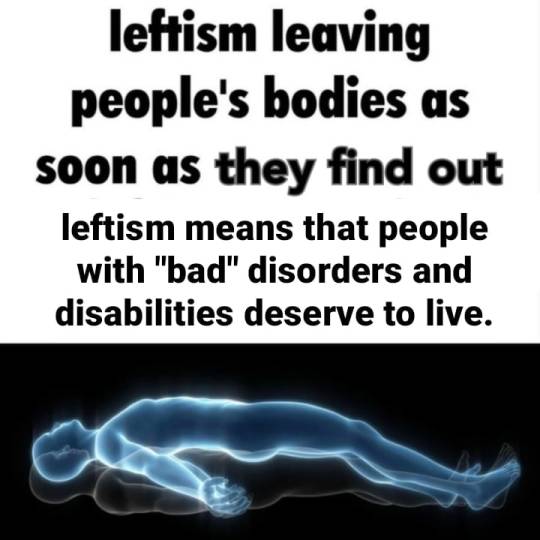
#“Disabled allies” when people with disabilities actually suffer and it's not just some kind of romanticized version with watered down#symptoms they see on TikTok and people with “bad” mental illness and disabilities more often than not actually need support and care#It's anti ableism until it's not convenient for them.#Leftist#Leftism#Bpd#Borderline#borderline personality disorder#schizophrenia#schizo spectrum#Actually autistic#Bipolar#Bipolar disorder#antisocial personality disorder#Narc abuse#Narc abuse isn't real#NPD#narcissistic personality disorder#Personality disorders#Mood disorders
1K notes
·
View notes
Text
*displays textbook symptomatic behavior of my own disorder that I am well educated on* what’s my deal why am I like this
#I know exactly why I’m like this but why am I like this#I know what’s wrong with me but wtf is wrong with me#adhd autistic#audhd creature#cluster a#cluster b#cluster c#personality disorders#bpd stuff#late diagnosed autistic#cptsd recovery#did osdd#bpd#audhd#adhd problems#audhd problems#borderline personality disorder#complex trauma#mood disorders#anxiety disorders#psychotic disorders#neurological disability#neurodivergent#neurodiversity#trauma disorders#traumagenic
456 notes
·
View notes
Text
Like this post if you take daily meds
#meds#medications#daily meds#actually disabled#actually mentally ill#actually disordered#disablity#mental illness#mental disorders#personality disorders#psychotic disorders#mood disorders
135 notes
·
View notes
Text
Manic episode bingo! (Written at 3am during a manic episode lmao)
For bipolar, schizoaffective, cyclothymic disorder, and the like (if you have manic episodes, use it! I don’t really care what mental illness causes yours. All is valid which is why I made it as inclusive as possible, so no gatekeepers or ableists though I know saying this won’t stop anyone)
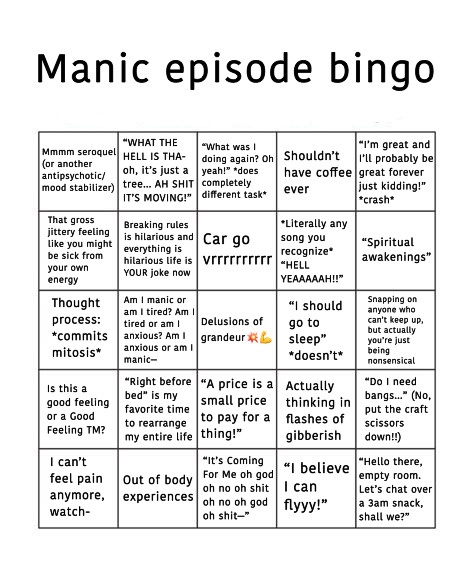
Here’s mine 🔥🎉📸👁️🫦👁️✨💥💪
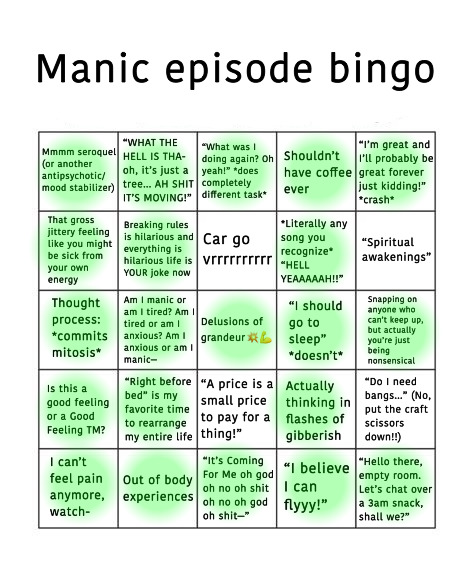
#flashy ✨ info#mentally illness bingo#mania bingo#mania#manic episodes#manic depression#actually bipolar#bipolar disorder#schizoaffective#actually bipolar 1#bipolar 2#cyclothymia#mood disorder#mood disorders#schizospec#schizoaffective disorder#actually psychotic#bipolar psychosis#bipolar mania#manic depressive#bipolar shit
83 notes
·
View notes
Text
Does Lestat have borderline personality disorder?

I am convinced Sam Reid’s Lestat has BPD—and I say this as a bisexual with BPD myself who loves and identifies with this crazy babygirl. While reading the books, I thought he was more likely to have bipolar because his highs and lows last for months/years, but in the show he has like EVERY common symptom of BPD (some of these I copy directly off of Mayo Clinic):
1. Mood-swings or little control over emotions, lasting from moment to moment or for hours/days.
2. Inappropriate, intense anger, such as frequently losing your temper, being sarcastic or bitter, or having physical fights.
3. A pattern of intense, unstable relationships.
4. Intense fear of abandonment.
5. Suicidal threats or behavior or self-injury, often in response to fear of separation or rejection. (Lestat threatens to set himself on fire—one of the few means of vampire suicide—when he feels like Louis is rejecting him/choosing Claudia over him. Also, in the books, Lestat frequently considers and eventually attempts suicide.)
6. Impulsive and risky behavior.
7. Rapid changes in self-identity and self-image. (We haven’t seen this as much in the show, but in the books Lestat loves, adores, and worships himself but, at the same time, loathes himself and feels unworthy of love. And Sam Reid mentioned this too: Lestat is a narcissist but, at the same time, has a lot of suppressed self-hatred.)
8. Ongoing feelings of emptiness. (Again you get this more in the books, with Lestat being depressed and feeling like the world is meaningless.)
Also want to note, in episode 1, Lestat says he “inherited his father’s tempter,” and people are often more likely to have a mental disorder if their parents have it too. I do think Lestat’s symptoms and behavior are very affected by the trauma he has been through and possible PTSD, on top of BPD or another mental disorder or mood disorder.... What are your thoughts?
#amc's interview with the vampire#Interview with the Vampire#The Vampire Chronicles#The Vampire Lestat#Lestat De Lioncourt#Sam Reid#borderline personality disorder#bpd#bipolar disorder#mental disorders#mood disorders#physcology#mental illness
329 notes
·
View notes
Text
Thinking someone with a mood/personality disorder is inherently bad/dangerous is sanist/ableist. How the media portrays us is wrongful and ignorant and can be refuted with research on what serious mental disorders are really like. People are people regardless of what they suffer from. This absolutely includes psychopaths/sociopaths/narcissists.
45 notes
·
View notes
Photo

(via (1) Pinterest)
#double binds#double standards#gender inequality#mood disorders#gender roles#toxic positivity#feminist memes#scott lynch
33 notes
·
View notes
Text

#sylvia plath#Emotions#Nothing#mental illness#bipolar disorder#mental problems#mood disorders#bipolar depression
38 notes
·
View notes
Text
Today I can't be bothered to hide how tired I am or how im feeling, I'm just too tired to try and hide it.
#mood diary#cyclothymia#mood disorders#mental health#low mood#documenting life#mum life#mentally tired#tired#too tired to pretend
9 notes
·
View notes
Text
Silly animatic about lithium / medication
-
Give it a view on Youtube, if you want to be kind (^-^)v
#bright colours cw#uuuh lmk if i need any more warning tags#I dont think there's anything fast/flashing as far as i can tell#bright colors#bright colours#photosensitive warning#medication#vent art#mental health#mentally ill#derealization#meds#lithium#mood disorders#animatic
10 notes
·
View notes
Text
My fellow peeps w bipolar!
Needless to say that Autumn is here (for those that this is irrelevant feel free to skip this post). And for us, this could be a troubling transition.
Winter is cold and dark, the holidays can be super stressful.
But Fall is this transition period, when it starts to get dark, it starts to get cold and lots of us start back with full time responsibilities like school for example.
Naturally, these are all well known triggers for depression, especially if you experience seasonal depression. Lots of acknowledgment on this topic everywhere.
BUT, be careful, because these triggers can also lead to a (hypo)manic episode. Work of any kind can result in sleepless nights. A constant fear of depression, desperate measures of preventing its occurrence, are triggering as well.
So, what I'm trying to say is, that transition periods in seasons can be confusing and annoying to most individuals. It's a time of change and adaptation. But if you have a mood disorder, it makes you liable to have an episode. Change, especially on such a scale, is dangerous for us and requires caution.
And as you take care of yourself-keeping an eye on your mental health-please make sure you don't disregard (hypo)mania.
Take this as a reminder that seasonal changes trigger any kind of mood episodes, even (hypo)mania.
#reminder#seasonal depression#mood disorders#bipolar disorder#actuallybipolar#manic depression#mania#actually bipolar#actually manic#actually mentally ill#bipolar mania#manic depressive#bipolar 1#bipolar 2#bipolar i#bipolar ii#cyclothymia#hypomania
52 notes
·
View notes
Text
just saw someone answer an ask with “aw why are you intimidated by me? I’m never mean! <3 well unless you’re weird lol”
sounds like every kid I went to high school with wow what a mean as fuck thing to say
#weird likkeeee autistic af??#weird like nonverbal?#weird like stims a lot??#weird like uses a mobility aid??#weird like has tics??#weird like cluster b???#weird like dissociative?? psychotic???#hm interesting#good to know#audhd problems#anti ableism#psychotic disorders#mood disorders#personality disorders#cluster b disorders#bpd thoughts#npd positivity#npd safe#aspd safe#dissociative disorder#complex dissociative disorder#did odd#complex trauma#trauma disorders#trauma recovery#complex post traumatic stress disorder#autistic trauma
112 notes
·
View notes
Text
as an aside, I'm thankful we have a lot of awareness and information available on bipolar spectrum disorders and I hope this only increases as time goes on but I admit it is frustrating to try to find information on my mood disorder only for 90% of the results to be only partially or entirely irrelevant to me. 'Rapid cycling is a symptom of some bipolar patients that causes them to cycle through four or more episodes a year' bestie these were my notes for yesterday.
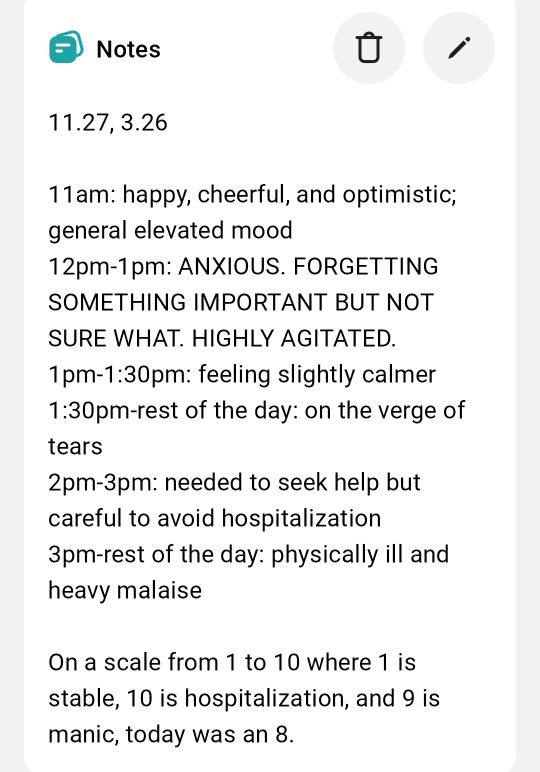
If that ain't rapid cycling, idk what is. just give me a specific technical term or something if we need to but gimme something.
as a bonus exercise, compare those notes to the timestamps on my posts yesterday. if I didn't seem that distressed, it's because I am very good at not getting hospitalized.
2 notes
·
View notes
Text
I just want to matter. For people to care about ME. It's lonely being the person there for everyone else's issues only to have mine discarded/ignored. Like I know I suck but why am I always less important. Why doesn't what I want or need ever matter...
#suicidal#selfish#self isolating#depression#depressed#im sad and angry#anxious#actuallytraumatized#psychotic disorders#bpd#sorry for being depressing#panic attack#anxiety attack#chronic insomnia#i want to be loved#i want to die#mood disorders#hurting#existential dread#sad girl#anxiety#trauma survivor#insominac
26 notes
·
View notes
Text
I'm getting really angry at how nothing about work or workplaces is geared for neurodivergents and especially autistics.
Absolutely nothing from the set up, the requirements, the social element, the hours, the expectations, the environment. Nothing.
Not the resumes and cover letters, nor the interviews, nor the vague conditions and agreements upon employment.
Am I a bit late to the party? Maybe. But it is because I only found out I was autistic in 2021 and have a patchy work history, leaving jobs, doing part-time gigs, and burning out in my education career.
I'm in severe burnout but also in a position where I have to get independent and fast away from my abusive family. I've basically dedicated my existence to job search, resume writing, and applications for the last 2 years (I lived with my partner for some of that time but had to leave the UK due to no full time job/visa and then with my parents the rest of the time working at the only career I've had that's paid me consistently: education).
The only problem is passion projects are impossible when you're burnt out, and careers often burn autistics out (because of set up of workplace cultures). I love teaching. I don't love demands, social elements and sensory overload.
My experience basically qualifies me most strongly for educational jobs.
But I am finding everyone is requiring so much all of the time, even in the process of hiring and giving you so so so little that it isn't even worth it.
'We'll hire you, but maybe only one day a week.'
'We don't know when you can start, HR has a huge backlog right now we will let you know when we know more.'
'You need to do these 5 trainings before you begin and go book fingerprinting and background checks.'
They want you to give everything and pay you a part-time wage.
Or they want you to give 40+ hours. Or super early in the morning (which is not possible with my burnout, mental health, moods and physical issues). Not to mention the 'benefits' of a minimal number of sick days they pat themselves on the back for 'awarding' you with, let alone miniscule holidays, and sickeningly low pay for cost of living.
It's all so hostile for NDs.
At first I looked and looked for something fulfilling, and since I have experience, education makes sense. I love teaching. But it's not great if I don't want to be burnt out and on the edge of meltdown daily.
Now I am looking for something part-time that leaves me alone and I can come home from not having been completely overloaded (maybe warehouse work, factories, bookstores, grocery stocking). I thought I wanted to be invested in what I was doing but coupled with what I'm experiencing and what I've read from others about their burnout and jobs, it looks like this may be the way to go.
To put this into perspective, even if something seems like a really good fit because of your experience/career/background or interests there will be a catch or a requirement that it is impossible to fulfill. There's a part-time youth instructing job at a recycling centre gearing them up for graduating and careers which sounded like a great fit until I got to the part where it said it needs you to have a driving license since you will 'ocassionally' need to transport students (ages 16-24!).
Why?
Why must I be an educator AND a social butterfly AND a driver and navigator?
Why?!
It's cheaper and better for them if their workers do everything but it's prohibitive to those of us that have issues and disabilities.
I'm sorry but my abilities as a teacher have no bearing whatsoever on my ability to drive. Driving extracts so much energy from me, is terribly dangerous when I am overwhelmed or melting down, and causes me to panic regularly. I don't notice as much what is going on around me when I am overwhelmed and make mistakes if I am pressured. I have trouble recognising a route even if I frequent it. Places look different at different hours of the day. My ability to navigate is extremely low. My ability to teach is honestly why I was born.
Why must every single role expect you to be neurotypical?
Why to protect our mental health can we only do minimum wage jobs?
Why is this system stacked against us?
I'm so frustrated right now and if I could just make some money to be independent of abuse I could funnel it into creating BETTER for us because we sure as anything deserve it.
#toxic workplace culture#accomodations#inclusivity#discrimination#actually autistic#neurodivergents#autistic burnout#talent profiles#patchy talent profiles#spectrum of abilities#ASD#personality disorders#mood disorders#ADHD#workplace accomodations#NT world#hiring#career#minimum wage#severe burnout#overstimulation#the system is broken#demand avoidance#high expectations#hostility#ND hostile#ableism in the workplace#looking for a job#routine based job#mental health
7 notes
·
View notes
Text

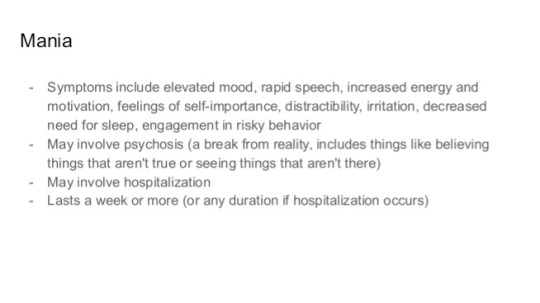
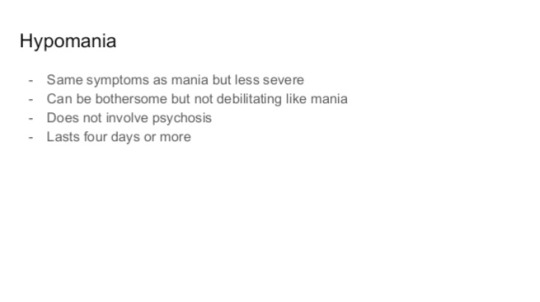

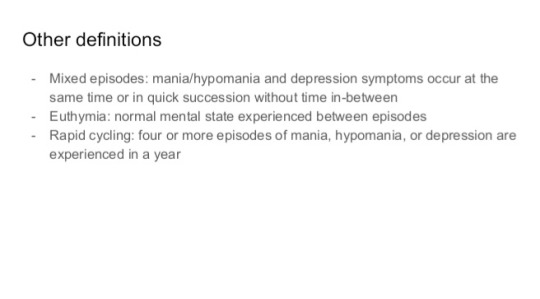
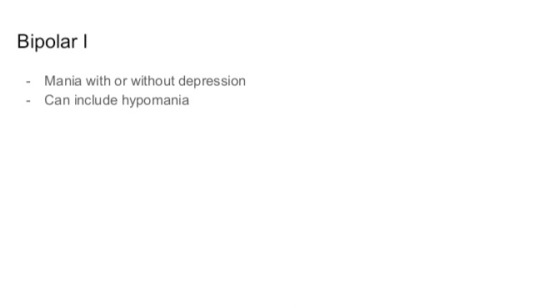



[Image description: a series of slides about bipolar disorder.
1:
Bipolar 101
from somebody who actually has it [smiley face]
2:
Mania
- Symptoms include elevated mood, rapid speech, increased energy and motivation, feelings of self-importance, distractibility, irritation, decreased need for sleep, engagement in risky behavior
- May involve psychosis (a break from reality, includes things like believing things that aren't true or seeing things that aren't there)
- May involve hospitalization
- Lasts a week or more (or any duration if hospitalization occurs)
3:
Hypomania
- Same symptoms as mania but less severe
- Can be bothersome but not debilitating like mania
- Does not involve psychosis
- Lasts four days or more
4:
Depression
- Symptoms include feelings of sadness or hopelessness, lack of energy, difficulty concentrating or remembering things, loss of interest, feelings of emptiness or worthlessness, feelings of guilt, self-doubt, over or under eating, sleeping too much or too little, suicidal thoughts
- May involve psychosis (though typically doesn't)
- Lasts two weeks or more
5:
Other definitions
- Mixed episodes: mania/hypomania and depression symptoms occur at the same time or in quick succession without time in-between
- Euthymia: normal mental state experienced between episodes
- Rapid cycling: four or more episodes of mania, hypomania, or depression are experienced in a year
6:
Bipolar I
- Mania with or without depression
- Can include hypomania
7:
Bipolar II
- Hypomania, no manic episodes
- Depression
8:
Cyclothymia
- Hypomania and milder depression
- Periods of euthymia are shorter; cycling is more frequent
- Symptoms must have been experienced for two years in adults and one in children in order to be diagnosed
9:
Treatment
- Common medications include mood stabilizers like lithium, anticonvulsants, and antipsychotics
- Antidepressants may be prescribed, but their use is controversial due to the possibility of triggering manic/hypomanic episodes
- The most common therapy is cognitive behavioral therapy, though others may be used
End description]
Updated version of my Bipolar 101 slideshow
2 notes
·
View notes